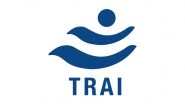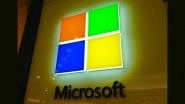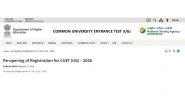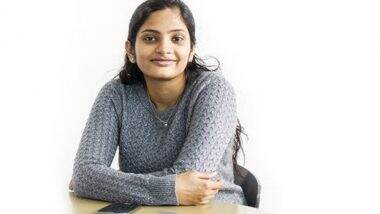Bengaluru, Sep 11: An Indian-born woman research scholar from the University of Washington won the Paul Baran Young Scholar Award for 2018 for using smartphones to detect life-threatening symptoms, the California-based Marconi Society, which has instituted the award, said on Tuesday.
"Nandakumar Rajalakshmi is the winner of this year's Young Scholar Award for her outstanding research work in detecting life-threatening symptoms using smartphones," the Society said in an e-mail to IANS.
Inspired by bats, which use sonar to navigate in the dark by sending acoustic signals and using reflections to identify objects, Rajalakshmi, 28, has turned a smartphone into an active sonar system to detect physiological activity like movement or respiration in a human body by a remote device.
"Rajalakshimi's system works by transmitting inaudible sound signals from a smartphone's speaker and tracking their reflections off the human body. The reflections are analysed by algorithms and signal processing techniques," the Society said in the e-statement.
The system is disrupting the sleep industry by creating a non-intrusive, low-cost application -- ApneaApp for detecting sleep apnea, a breathing disorder that affects millions of people the world over and yet remains undiagnosed.
"I wanted to find a way to detect physiological signals, like pulse and heart rate, which are used for healthcare applications. When I found that many consumer electronic devices have speakers and microphones, I decided to study if inaudible signals could help detect physiological movement," Rajalakshmi told IANS via another e-mail.
The Society will honour Rajalakshmi with the award on October 2 at Bologna, Italy. "Being recognised by the Marconi Society is humbling and motivates me to excel further in this field and to have a much larger impact," she said.
Paul Baran (1926-2011), a Polish-born Jewish American engineer, was a pioneer in the development of computer networks. He won the Marconi Prize in 1991 for inventing packet switching technology, used in data communications, worldwide.
Set up in 1975 by Marconi's daughter Gioia Marconi Braga through an endowment, the Society annually awards outstanding individuals whose scope of work and influence emulate the principle of "creativity in service to humanity" that inspired Marconi.
The young scholars are selected by an international jury of engineers from leading universities and firms on nomination from their academic advisers.
The award consists of $5,000 (Rs 362,500) and expenses to attend the annual ceremony.
"More than the prize, Young Scholars are offered mentoring and guidance by the Society's distinguished roster of engineering greats," added the statement.
A post-doctorate scholar in the University of Washington's Paul G. Allen School of Computer Science & Engineering at Seattle, Rajalakshmi went to the US in 2013 after a two-year stint as a research assistant at Microsoft India Research Centre in Bengaluru during 2011-13.
She graduated in B.Tech from Guindy College of Engineering in Chennai after studying at TVS Lakshmi School in the temple town of Madurai in Tamil Nadu.
Rajalakshmi's parents run a healthcare devices firm Ideal Diagnostics Ltd at Madurai, about 460 km southwest of Chennai.
"My father was in the healthcare sector when I grew up and spent a lot of time in these environments. The best part of my work is seeing the people using my technology and knowing that it benefits their well-being. As a computer scientist, I find it very fulfilling," recalled Rajalakshmi.
Before Rajalakshmi developed the ApneaApp, diagnosing sleep apnea was an expensive polysomnography test that involved an overnight stay in a hospital or sleep clinic connected to a tangle of wires, or in-home systems with high failure rates due to the accidental detachment of sensors during sleep.
Whereas, ApneaApp needs no instrumentation of the individual and can track a person's breathing remotely from home.
After proving the effectiveness of her app, Rajalakshmi and the University of Washington licensed the innovation to ResMed, a leader in sleep technology and medical devices.
The technology was built into the new SleepScore app for Android and iOS that helps individuals to monitor their sleep quality.
"Rajalakshmi has a knack for selecting problems with high social impact," said her advisor and associate professor at the university Shyam Gollakota on the occasion.
"What's incredible is Rajalakshmi has innovated a technology that is like science fiction and has got it adopted by hundreds of people in the real world. It is rare for a graduate student to have such impact with even one application, and she is doing it time and again," reiterated Gollakota.
Rajalakshmi's latest work focuses on using sonar to detect opioid overdoses. About 100 people reportedly die daily in the US due to overdosing on opioids, making it a critical healthcare issue.
Deaths from overdose are preventable through timely detection and intervention. Rajalakshmi developed an app that people can download prior to engaging in high-risk behaviour that monitors breathing and other movements and automatically alerts emergency services or other help if these activities cease.
The application was also tested at a clinic in Vancouver, Canada, showing its ability to save many lives through early detection of the symptoms.
"Our Young Scholar award attracts the world's brightest researchers. Rajalakshmi embodies the characteristics we seek - intellectual capability, entrepreneurial spirit and the vision to use her work to better humankind," said Marconi Society's Chairman Vincent Cerf.
(The above story first appeared on LatestLY on Sep 11, 2018 02:05 PM IST. For more news and updates on politics, world, sports, entertainment and lifestyle, log on to our website latestly.com).













 Quickly
Quickly


